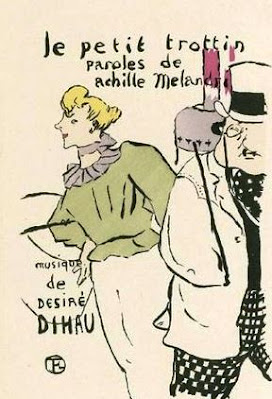This morning, while I am waiting to see Dr. Feight, I find among his magazines an expensive-magazine-sized and -shaped book of Toulouse-Lautrec plates. It doesn’t include Le petit trottin, an illustration Toulouse-Lautrec made for the cover of some sheet music, and the subject of a long-ago poem by my friend Rick Dietrich, who, like every poet since Keats, has written a wan version of “Ode on a Grecian Urn.”
 |
| To listen to Rick read the poem, click here. |
Tonight,
I am the wicked gentleman
disappearing
from Toulouse-Lautrec’s cover
for
his cousin’s song: the crumpled top hat,
the
cane over his shoulder, the down-turned moustaches
and
drooping jowls, the dotted green ascot
and
green checked trousers—one thick leg vanishing
into
the space that marks the cover’s edge,
but one leg left behind solidly planted,
and one eye left behind, leering from behind
its
monocle, glued to Le Petit Trottin—
the
name of Toulouse-Lautrec’s cousin’s song,
“The
Little Errand Girl”—though she is not
so
little, the leering gentleman observes,
her
blond hair upswept over sensual ear,
her
pink mouth, the lilac ribbon around
her
pretty throat.
“What do you have in your
basket, ma chère?” he is—without thinking—
for ever thinking, while she keeps him
there, fixed in the corner of her eye,
till the other thick leg can take the next step,
and he can disappear for good.






